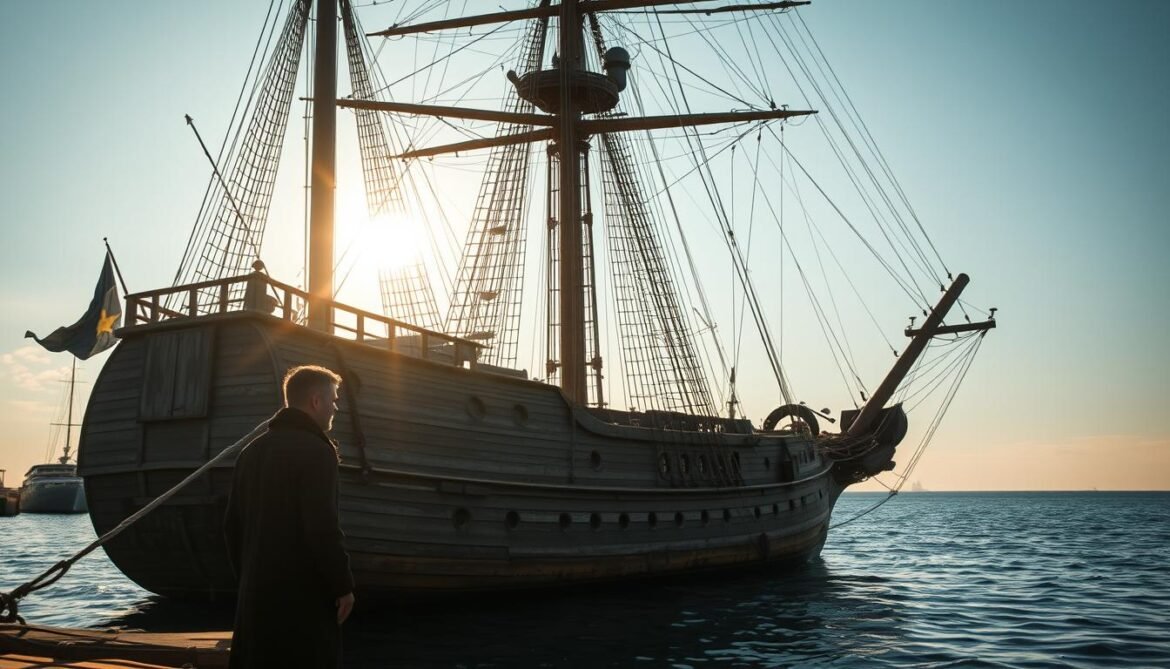Imagine if every cell in your body was replaced, one by one. Would you still be you? This question is at the core of the ship of theseus paradox. It’s a puzzle that has puzzled thinkers for centuries.
The paradox makes us think about what makes us who we are. Picture a legendary ship that’s been fixed and replaced over time. Eventually, no original part is left. When does it stop being the original ship?
This thought experiment digs deep into identity, change, and existence. Philosophers have argued about whether something remains the same if all its parts change. The ship of theseus paradox is a deep dive into what makes something truly itself.
The paradox makes us rethink our ideas about staying the same and changing. It shows that identity might be more flexible and complex than we think. It challenges our view of what keeps something the same over time.
Understanding the Ancient Greek Origins
The Ship of Theseus paradox comes from ancient Greek philosophy. It makes us think about identity and change. It’s a deep puzzle that questions how things stay the same over time.
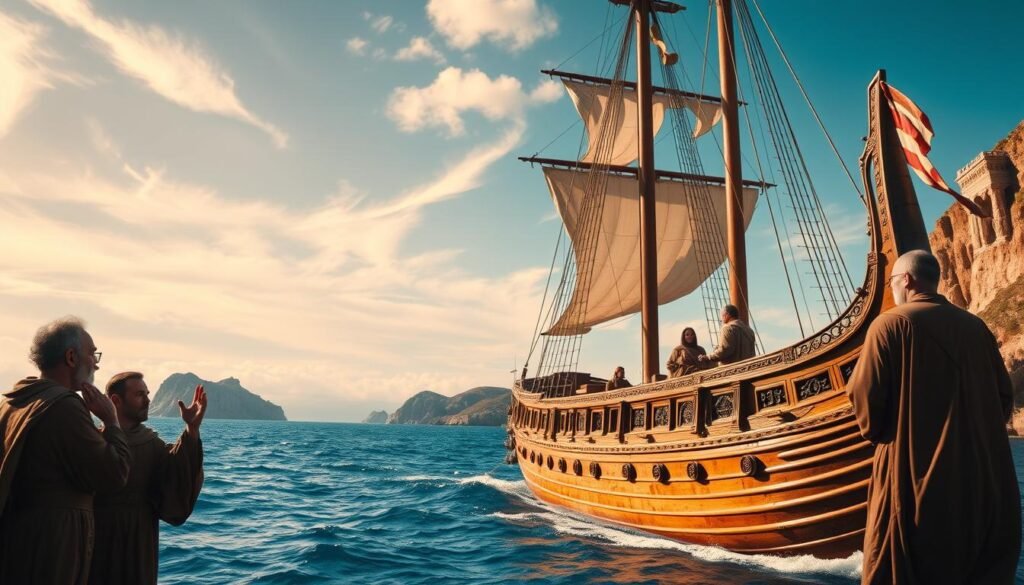
The idea started with Plutarch, a famous Greek writer. He explored big questions that made people think differently.
Plutarch’s Original Account
Plutarch wrote about Theseus’s ship in a way that made people think. He asked a simple yet complex question:
- If every part of a ship is replaced over time
- Is it still the same ship?
- Or is it something new?
Historical Context and Cultural Significance
The problem of the ship reflected Greek thoughts on identity and change. Greek thinkers wanted to know about permanence and transformation.
The ship is a symbol for deep questions about existence.
The Role of Theseus in Greek Mythology
Theseus was a hero in Greek stories, known for his journey and change. His ship was more than a boat; it was a symbol of human life and identity.
This paradox still puzzles philosophers and scientists today. It shows that some questions are always important, no matter the time.
Ship of Theseus Paradox: Core Concept and Philosophy

The Ship of Theseus paradox is all about understanding identity through change. It’s an ancient puzzle that makes us think about what makes an object truly itself.
Imagine a wooden ship. Over time, each plank is replaced, until nothing original is left. The question is, is the ship still the same?
- The paradox of continuity emerges when we consider the ship’s identity
- Each replacement part transforms the object’s physical composition
- The underlying philosophical question challenges our understanding of persistent identity
Many philosophers have tried to solve this puzzle. Is the ship still the original vessel after complete transformation? It makes us think deeply about identity, persistence, and change.
The Ship of Theseus reveals that identity is not merely about material composition, but about something more complex and nuanced.
This puzzle is not just about ships. It makes us think about personal identity, consciousness, and existence. It challenges our basic ideas of sameness, leading to deep thoughts.
The Two-Ship Problem by Thomas Hobbes
The Ship of Theseus paradox gets a twist with Thomas Hobbes’ ideas. He explores the gradual replacement paradox in a new way. This makes us think more about who we are and our identity.
Hobbes came up with a mind-bending scenario. A shipkeeper gathers all the old parts and builds a new ship. This makes us question what makes a ship truly itself.
The Original Ship and Its Reconstruction
The two-ship problem brings up important questions:
- Which ship is the true original?
- Can changing parts keep a ship’s identity?
- What makes an object truly itself?
Philosophical Implications of Material Identity
Hobbes’ twist on the paradox makes us face big philosophical questions. The paradox gets even more interesting when the old parts make a new ship.
The Question of Authenticity and Continuity
This thought experiment makes us think deeply about identity. It shows that being ourselves might not just be about our bodies. It’s about something deeper and more complex.
The essence of an object may transcend its physical components.
Hobbes’ two-ship problem makes us rethink our views on change, continuity, and existence. It invites us to explore the true nature of being.
Modern Interpretations and Applications
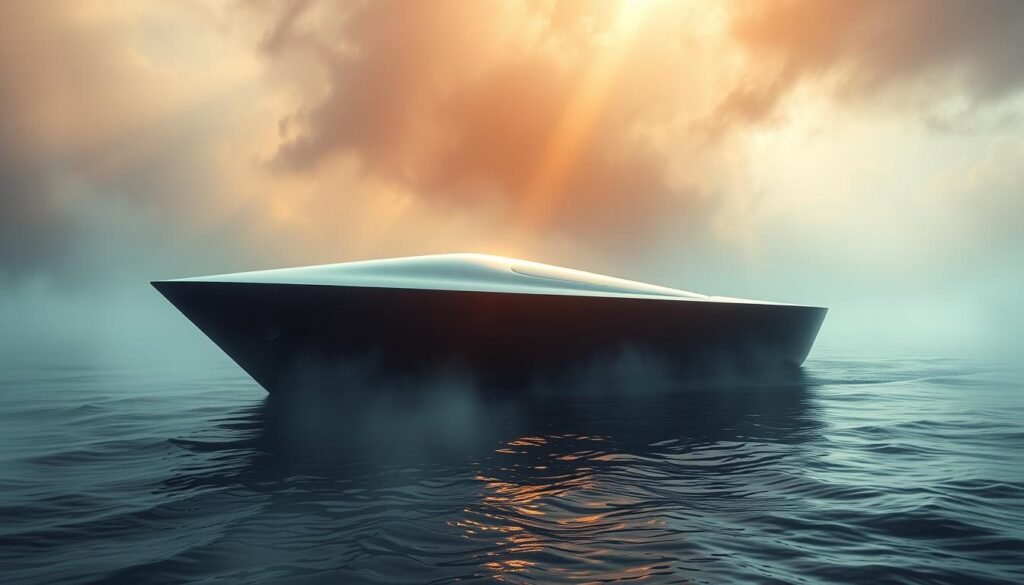
Plutarch’s thought experiment still puzzles philosophers and researchers today. The Ship of Theseus paradox has grown from an old puzzle to a key topic in modern thought. It explores identity and change in many fields.
Now, people look at this problem in many ways, not just in philosophy. It’s used in fields like:
- Artificial Intelligence development
- Cognitive science research
- Personal identity theories
- Neuroscience and consciousness studies
In cognitive science, the Ship of Theseus paradox helps us understand how we see ourselves. It looks at how we see ourselves as the same over time. It’s about how our bodies and minds stay the same, even when they change.
Artificial intelligence experts also find this idea interesting. Machine learning systems that change a little bit at a time make us think about what makes them “us”.
Today’s technology has made Plutarch’s old idea very relevant. It helps us think deeply about what’s real, lasting, and changing in many areas of study.
Identity Through Change: Philosophical Perspectives
The Ship of Theseus paradox makes us question our basic views on identity. Philosophers have come up with various theories to figure out how things and people stay the same despite changes.
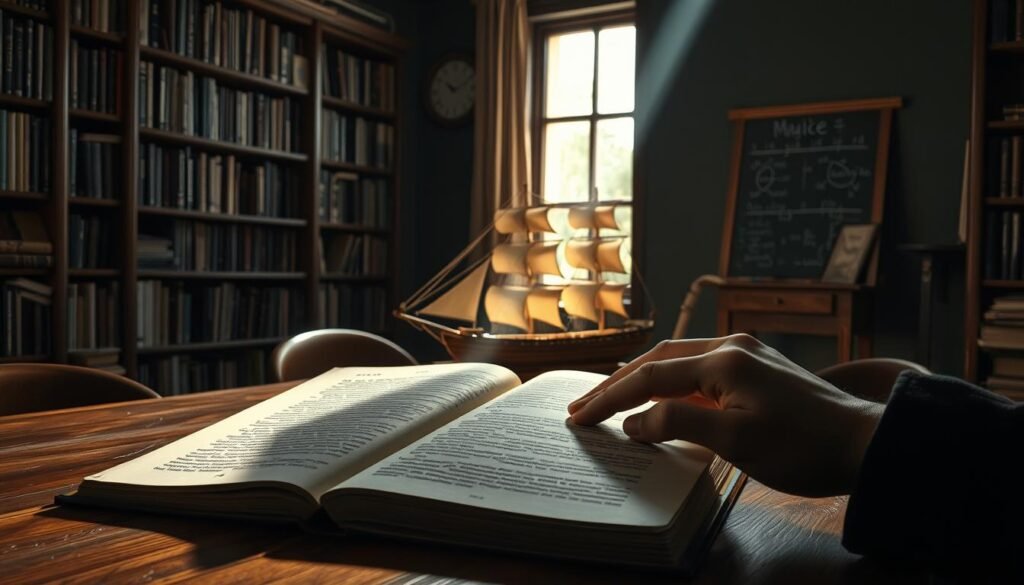
There are many ways to look at identity, each offering its own insights. These views try to understand how things change and stay the same at the same time.
Material Constitution Theory
Material constitution theory looks at how objects relate to their parts. It focuses on:
- How objects keep their identity even when parts are replaced
- The true nature of an object beyond its physical makeup
- The limits of how much an object can change
Temporal Parts Theory
Temporal parts theory sees identity in a new light. It suggests:
- Things exist as four-dimensional beings that stretch through time
- Identity is a continuous journey, not a fixed point
- Every moment is a unique part of a being’s existence
Cognitive Science Approach
Cognitive science brings a fresh view on personal identity. It looks into:
- How our brains recognize and remember things
- The ways our minds see ourselves
- The importance of being aware in keeping our sense of self
Every philosophical view gives us a different way to see how things and people stay the same through big changes. These ideas challenge our basic ideas about existence and staying the same.
Cultural Variations and Similar Paradoxes
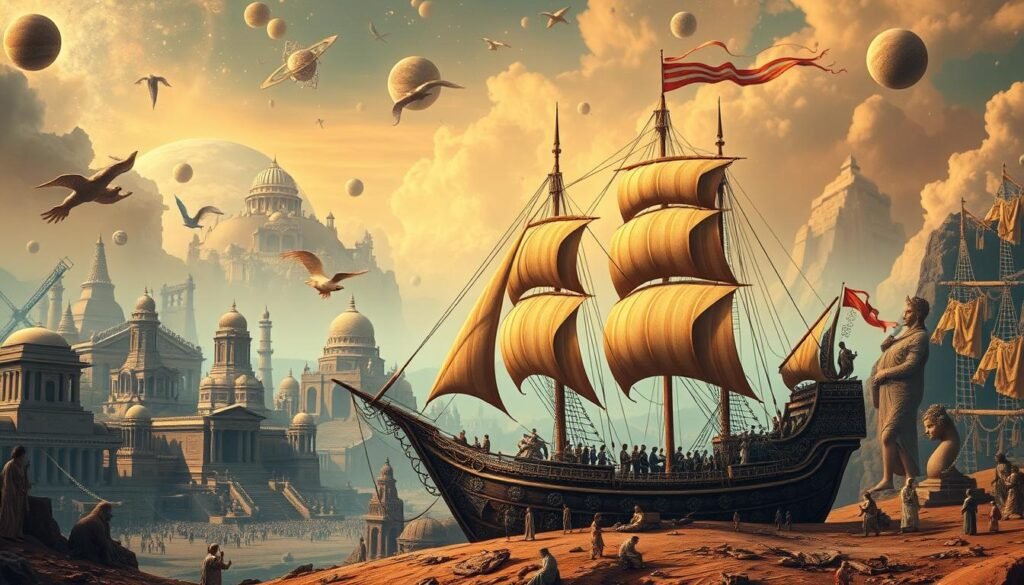
The ship of theseus paradox is more than just an ancient Greek story. It has sparked interesting debates in many cultures. These debates ask big questions about who we are and how we change.
Many examples show us similar puzzles:
- Grandfather’s Axe: A story about an axe with a new handle and head each time, making us wonder if it’s still the same axe
- Trigger’s Broom: A funny take on the ship of theseus paradox from today’s world
- Japanese Ise Grand Shrine rebuilding: Every 20 years, a sacred building is rebuilt, keeping its spiritual value while changing physically
“Change is the only constant in the universe” – Ancient Philosophical Wisdom
Different cultures face the same big questions about identity. They use humor, religious rituals, or deep thinking to try to understand what makes something truly itself.
The ship of theseus paradox makes us think about change. It makes us question our ideas about staying the same and changing in many cultures.
Practical Applications in Contemporary World
The Ship of Theseus paradox is more than just a thought experiment. It touches on modern technology and ethics, showing us deep insights into who we are and how we change.
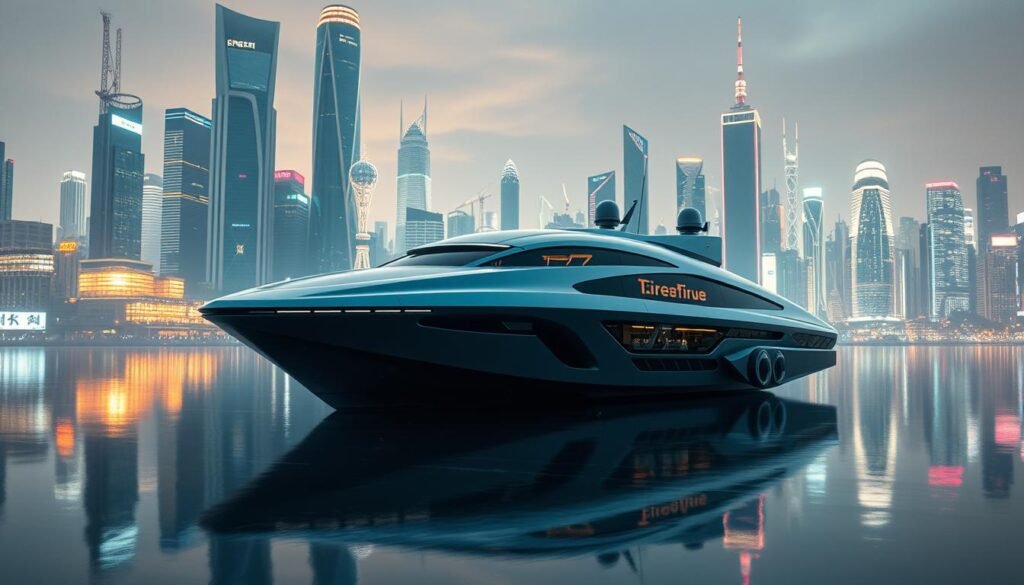
This ancient puzzle now shows up in places we least expect. It makes us question what it means to be ourselves and how we change.
Technology and AI Development
Artificial intelligence brings a new angle to the gradual replacement paradox. As AI gets smarter and updates itself, we face big questions:
- Does an AI stay the same if its parts are changed one by one?
- How do we keep track of changes in AI learning?
- Can an AI’s true self stay the same even as it changes?
Personal Identity in Modern Context
Digital spaces like social media change how we see ourselves. Our online selves and digital avatars keep evolving.
Our identities are no longer static, but fluid constructs constantly being reconstructed.
Legal and Ethical Implications
The paradox makes us rethink old ideas about ownership and responsibility. Legal systems face new challenges like:
- Digital inheritance rights
- AI system accountability
- Intellectual property in changing tech
Looking at identity through gradual change helps us understand both humans and technology better.
Scientific and Metaphysical Solutions

The Ship of Theseus paradox makes us think deeply about identity. Scientists and philosophers have come up with many ways to solve it. They look closely at the idea of continuity.
Researchers have a few main ideas to tackle the paradox:
- Qualitative Identity: Looking at what makes objects the same
- Numerical Identity: Figuring out what makes something “one”
- Persistence Theory: Understanding how things stay the same over time
Modern cognitive science brings new ideas to this old problem. Quantum physics shows that everything is always changing. This view makes the Ship of Theseus problem seem like a continuous process, not a fixed state.
The true nature of an object might not be in its parts, but in its pattern and continuity.
Metaphysical solutions see identity in two main ways: material and temporal parts. These ideas help us understand how things stay the same even when they change.
Even though there’s no clear answer, these ideas help us understand identity and change better.
Conclusion
The Ship of Theseus paradox is a deep question that still puzzles us today. It started in ancient Greece and now affects our views on change and what stays the same. This paradox shows how tricky it is to keep an identity through big changes.
Many thinkers have looked into this paradox. They see it as a way to understand how things, and even who we are, stay the same even when they change a lot. It makes us think about what really makes something or someone who they are.
In our fast-changing world, the Ship of Theseus paradox is more important than ever. It helps us think about things like AI, personal growth, and what it means to be alive. This old idea still gives us deep insights into life and how things change.
At the end, the ship of theseus paradox teaches us about the changing nature of identity. It pushes us to look deeper than just what we see. It makes us think about the big questions of existence, staying the same, and what it means to be.

